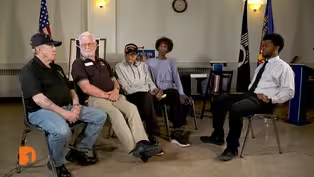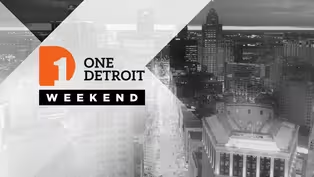
Detroit We Dey film highlights city’s Nigerian community
Clip: Season 7 Episode 52 | 5m 10sVideo has Closed Captions
Detroit filmmaker premieres Detroit We Dey short highlighting the city’s Nigerian communit
Detroit filmmaker Ozi Uduma showcases the city’s Nigerian community in a short film “Detroit We Dey” for the PBS digital series “Homegrown: Future Visions.” The documentary takes a compelling look at the history and future of a social club, called the Old Bende Association, founded by a community of Igbo-Nigerians who immigrated to Detroit in the 1970s and ‘80s.
Problems playing video? | Closed Captioning Feedback
Problems playing video? | Closed Captioning Feedback
One Detroit is a local public television program presented by Detroit PBS

Detroit We Dey film highlights city’s Nigerian community
Clip: Season 7 Episode 52 | 5m 10sVideo has Closed Captions
Detroit filmmaker Ozi Uduma showcases the city’s Nigerian community in a short film “Detroit We Dey” for the PBS digital series “Homegrown: Future Visions.” The documentary takes a compelling look at the history and future of a social club, called the Old Bende Association, founded by a community of Igbo-Nigerians who immigrated to Detroit in the 1970s and ‘80s.
Problems playing video? | Closed Captioning Feedback
How to Watch One Detroit
One Detroit is available to stream on pbs.org and the free PBS App, available on iPhone, Apple TV, Android TV, Android smartphones, Amazon Fire TV, Amazon Fire Tablet, Roku, Samsung Smart TV, and Vizio.
Providing Support for PBS.org
Learn Moreabout PBS online sponsorship(smooth music) - Right now it start with the adults to do their new year or end of year.
And you know what that means?
It means dance, dance, dance and dance.
- [Bill] "Detroit We Day," a short PBS film about the lives of Nigerians in Detroit, preserved in snapshots and on VHS tape.
- To the uninitiated, this is an extremely chaotic scene, but for me, this is what it means to be Nigerian in Detroit.
The title is basically Nigerian English or Nigerian Pidgin and it's just essentially rough translation of "Detroit, we're here."
Of all the places my parents, aunties and uncles could have immigrated to, they chose Detroit.
It was my way of fusing both one part the Nigerian community, and also like the kind of throw to acknowledgement of Detroit, I should say.
They came to a place that was the complete opposite of where they grew up.
I'm really excited for the larger community to see the film because they.
- [Bryce] Detroiter Ozi Uduma directed "Detroit We Day."
- There has been a lot of like just pride and happiness around the existence of this film and some type of documentation of the history of the community.
- [Bryce] The Nigerian diaspora, many immigrated to the United Kingdom and places across the US.
- Outside of Detroit, we have everywhere from Chicago to New York.
Houston, Texas is the one that is like, I would call the headquarters of the Nigerian diaspora, Atlanta, LA, so the Nigerian diaspora is pretty big.
But in terms of Detroit, a lot of folks came to Detroit because of the educational opportunities.
So a lot of the elders in my film went to Wayne State.
- We don't know anybody here.
We don't have family here.
I've never been in a big city before.
So it was scary, of course.
- [Film Participant] It became obvious to many that were here to stay.
- [Bryce] Military oppression in the old country had worsened.
Through their social club, Nigerians here found a way to hold onto their culture.
- The old Bende Cultural Association of Michigan became a pillar of support for new immigrants from the Bende area of Abia state in Nigeria.
The kind of big umbrella organization, the Nigerian Foundation of Michigan was founded sometime in the mid, I think, late '80s, early '90s and so those parties had been going on for a long time.
- And then when they go to these events and then they wear their Gele, they wear their rapa, you see the beauty and the elegance of our clothes.
It also amplifies the beauty and the elegance of our culture and where they come from and who they are.
You know, you kind of you try to navigate two worlds, right?
Because here in this household, you're Nigerian, you're not American.
It's very clear that that's the statement that's said.
But when you go to school, right, you're just a Black kid.
- It is not just the Nigerian community that we're growing up with, but the larger Black community in the Detroit area.
And so for us, it was easier in some ways, I think.
I think there was always fears from our parents that, oh, would people make fun of us because our names are different.
Or the kids eat different foods, we're not sending them to school with peanut butter and jelly sandwiches.
We're sending them to school with rice and plantains and how will the other kids react to our children?
As a majority Black city, it feels like home.
There's so much pride in being a Detroiter of the diaspora.
(native drumming) - [Bill] To be West African in Detroit, there's more awareness now.
The music, the food, it's the internet and social media spreading the word.
- There are a lot more Nigerian restaurants that are very popular in the city.
Turning on the radio and hearing Afrobeats was something that I never imagined would happen as a kid.
I don't have to do too much of the explaining about this community as much, especially to folks who are in the Metro Detroit area.
There's a new generation of young Nigerians in the city using their talents to preserve the work, history and culture of our people.
Now what I've learned as of recent is that a lot of people don't know that there are a lot of Africans in the Midwest, particularly in Detroit.
I don't want folks to fear the fact that there are folks who are immigrants, folks who are maybe not a part of the traditional American story who are here in this country.
- [Bill] In her film, Ozi Uduma asks, "Long term, how can Detroit's Nigerian traditions be kept alive?"
"Detroit We Day" is a start.
- Everybody's story, everybody's histories should be documented.
I hope things like my film can act as a bridge or act as this piece to help connect one family to another family or one potential group of friends to another group of friends.
Because I think those bridges and those connections are very, very important.
- [Narrator] Ozi Uduma's film, "Detroit We Day" premieres June 1st.
Go to OneDetroitPBS.org to learn more.
Michigan veterans commemorate Memorial Day
Video has Closed Captions
Clip: S7 Ep52 | 7m 9s | Michigan veterans commemorate Memorial Day with reflection and remembrance. (7m 9s)
One Detroit Weekend: May 26, 2023
Video has Closed Captions
Clip: S7 Ep52 | 2m 49s | Check out some events happening around Detroit this weekend on “One Detroit Weekend.” (2m 49s)
Providing Support for PBS.org
Learn Moreabout PBS online sponsorship
- News and Public Affairs

Top journalists deliver compelling original analysis of the hour's headlines.

- News and Public Affairs

FRONTLINE is investigative journalism that questions, explains and changes our world.












Support for PBS provided by:
One Detroit is a local public television program presented by Detroit PBS

